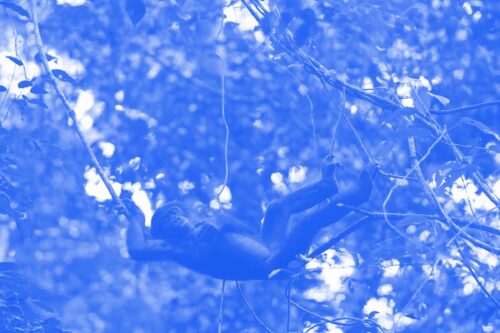Having conversations about people’s future plans, and realizing just how impressive they are, is a quintessential Harvard experience despite our awareness of the impressiveness of professors and students alike. Such is the case with Professor Martin Surbeck, from the department of Human Evolutionary Biology, who will be spending much of the winter and spring semester working in a community forest in the Democratic Republic of the Congo. The site is dedicated to protecting and studying bonobos, an endangered species and humans’ closest living relatives alongside chimpanzees.
Started in 2016 with support from the Bonobo Conservation Institute and Vie Sauvage, two NGOs dedicated to bonobo preservation, Surbeck’s research site provides a remarkable combination of local support and international research opportunities. Establishing a site well-populated by bonobos meant utilizing land already occupied by native villagers. Rather than pursuing research at the expense of locals, Surbeck’s team has worked towards cultivating a mutually beneficial relationship with the historic inhabitants of the land. Local Kokolopori villagers comprise the vast majority of the site’s staff. Trained in behavioral data collection by Surbeck’s team, they are offered well-paid employment in an area with severely limited economic opportunity. “For how remote it is, there are a lot of people living there. There are not a lot of income sources for the locals, and selling smoked caterpillars is one of their only options,” Surbeck explained. Locals’ jobs on the preserve mainly consist of tracking bonobos and recording their behavior over the course of the day.
In addition to his research, Surbeck works to ensure successful follow-through on agreements made with the Kokolopori people. He primarily works with village elders and provincial leaders. “As a rent of the forest, we invest in local infrastructure like schools… I think that that’s where money should be spent. That’s where they live, and they’re the crucial player,” he said. Surbeck believes in offering the Congo that which they have historically been deprived of by Western forces: respect, fairness, and appropriate compensation. His efforts are a huge improvement over the historically barbaric treatment of the Congolese by the West, serving as an example of how researchers can ethically work with indigenous peoples.
Despite sharing the same common ancestor with humans, bonobos are very understudied compared to chimpanzees, Surbeck shared. This is largely due to the physical and behavioral connections observed between humans and chimpanzees, such as a similar skull shape and a willingness to engage in warfare. Bonobos demonstrate a much higher level of egalitarianism between the sexes than chimpanzees, as seen in the lack of sexual coercion in bonobo groups. The females of a given group will violently lash out against and even exile males that make unwanted advances on females. Determining why this stark difference in chimpanzee and bonobo behavior exists is one of Surbeck’s main research goals.
Even so, “We have to be careful to not over-romanticize bonobos,” he said. Surbeck described situations where bonobos demonstrate less care to each other than chimpanzees would in parallel circumstances. For example, male chimpanzees of a given group form tight bonds in order to facilitate collective engagement in warfare. But male bonobos of a given group lack this motivation to pursue the same level of camaraderie because of their relative peacefulness.
The anthropologist and primatologist Jane Goodall often discussed her personal connection to the chimpanzees she lived with and specific instances of compassionate chimpanzee behavior that she directly observed. Surbeck has a more balanced perspective on bonobos:
“I’m somebody who worked with insects and birds. If I wasn’t a professor I would be a farmer. I don’t feel a spiritual connection to animals, I just enjoy being around them. However, if you spend years around a species, especially if they’re long-living, you start to develop opinions about the different individuals. Some are cute, some are jerks… The first time a female bonobo felt comfortable going to sleep in front of me, that was very special.”
Surbeck’s research and oversight of the Kokolopori bonobo site are some of the greatest assets he brought to Harvard. However, the University was not fully prepared to support his continued research, as trips like his current one require him to spend a significant amount of time away from Cambridge and administration of a research site in the Democratic Republic of the Congo can be challenging. But the University has been progressively more accommodating of his efforts in the Congo, Surbeck said: “There’s an idea of how things have to be done at Harvard, which sometimes doesn’t easily facilitate getting things done in Africa. There are a lot of people that help me, though. If you talked to me a year ago, I would express more frustration.” Surbeck’s work in the Democratic Republic of the Congo also provides many research opportunities for PhD and postdoctoral degree students to analyze the data collected by employees of the preserve, and he should be able to continue his political, logistical, and research efforts at the Kokolopori site for the foreseeable future.
Harry Cotter ’25 (harrycotter@college.harvard.edu) thinks that maybe we should try and be a little more like bonobos.

